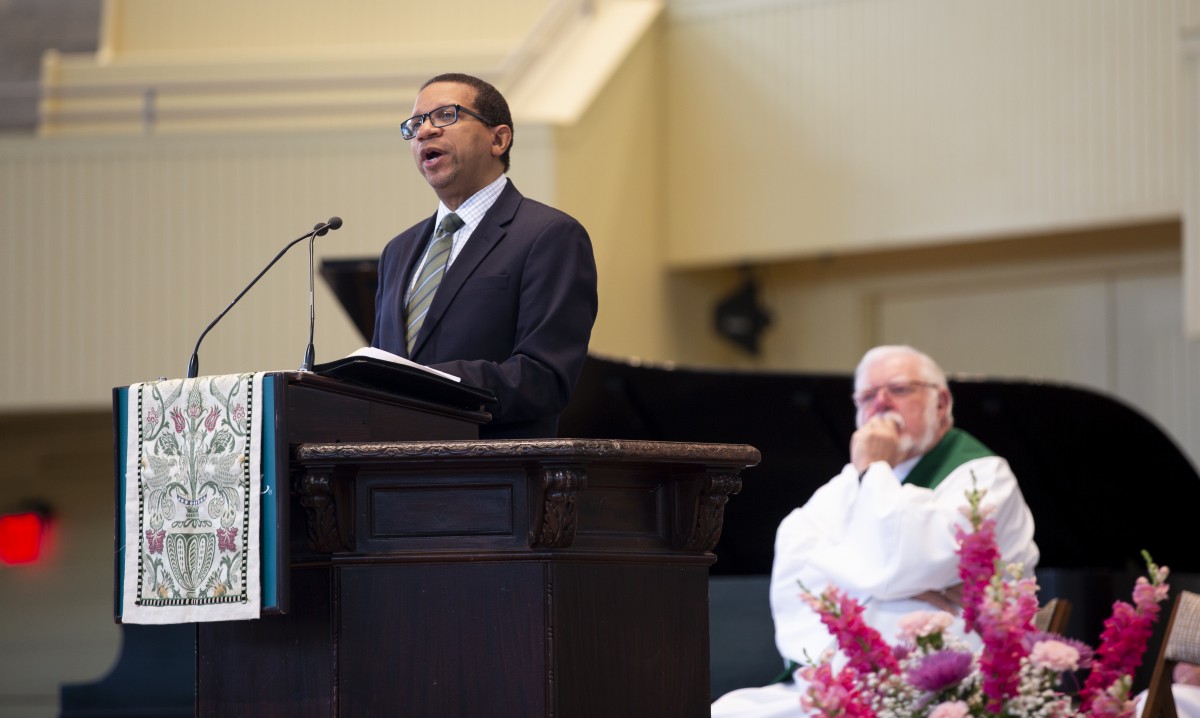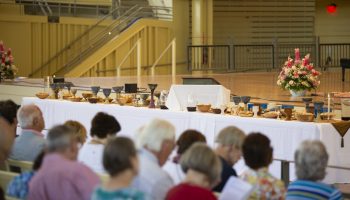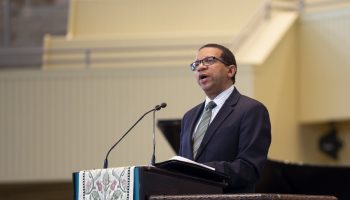“Has anyone ever interrupted you? It gets on your last nerve,” said the Rev. David E. Goatley at the 9:15 a.m. Tuesday morning worship service on July 10 in the Amphitheater.
His sermon title was “A Welcome Interruption,” and his text was the Gospel of Luke 7:11-17, Jesus’ healing of a widow’s son.
“Have you ever been in a conversation with someone so addicted to their smartphone that they leave you to respond to every beep, buzz and ring?” he asked. “And before caller ID, didn’t you hate interruptions by telemarketers at dinner? Or how about when a woman is talking and a guy just talks right over her?”
Interruptions are often aggravating, Goatley said.
“You are trying to read, and someone keeps interrupting you,” Goatley said. “You are watching television, and someone interrupts you. You are having a time of quiet reflection, and someone won’t stop talking.”
But on occasion, he said, interruptions are welcome.
“We have been fixated on Thailand and the soccer team trapped in the cave,” Goatley said. “This morning we learned that all 13 are safe. That was a welcome interruption with good news.”
In Luke’s story, there are two crowds. The first crowd was following Jesus into town.
There was another crowd coming out of town, Goatley said, a funeral procession on foot.
“Do you remember when cars would pull over to the side of the road to let a funeral procession pass?” Goatley said. “It was a sign of respect so that people could get to the burial ground. Today, you need a police car to make that happen.”
The funeral in Luke’s story was heart-wrenching because not only had the mother lost her only son, she was also a widow. Her livelihood, in that culture, was connected to an adult male. She not only had a wrenching emotional loss, but her life was heading in the direction of poverty, dependency and vulnerability.
“The crowd with Jesus may have moved to the side of the road, but Jesus headed right for the procession and the dead man,” Goatley said. “He aimed for the body and touched the bed and brought him back to life.”
Jesus had compassion for the mother in her heartbreak.
Her pain drew him in, Goatley said.
“He didn’t avoid her difficulty or the death that everyone else avoided. He used his life to interrupt her heartache,” Goatley said.
Jesus brought about a great reversal, taking a funeral procession and turning it into a parade of joy. He was not afraid to break protocol. He violated the common practice of not touching a dead body.
“Jesus is not afraid of our pain, the hopelessness, even the death that surrounds our families, communities and the world,” Goatley said. “Jesus knows our practice but says, ‘Not today.’ Jesus knows our grief and says, ‘Not today.’”
Perhaps, Goatley said, Jesus is “calling you to a ministry of interruption, to help someone change direction for a day or for a lifetime.”
For those who live in darkness, for those in poverty, for those who live in violence, for those who are sick: “Not today,” Goatley said.
We know what normally happens, but not today because “Jesus does not avoid pain, hopelessness, grief, fear or anxiety. He offers a ministry of interruption,” Goatley said.
“ ‘When he calls me I will answer, I’ll be listening for my name,’ ” Goatley said, quoting the hymn by the same name. “Perhaps you are called to a ministry of welcome interruption.”
The Rev. George Wirth presided. David Hidi, a scholarship student with the International Order of the King’s Daughters and Sons, read the Scripture in English and Hungarian. Hidi lives in Nagydobrony, Ukraine, and studies English language and literature at the Ferenc Rakoczi II Transcarpathian Hungarian Institute. Jared Jacobsen, organist and coordinator of worship and sacred music, directed the Motet Choir in “The Garden Hymn,” arranged by David W. Music from Southern Harmony. The Lois Raynow Fund for the Department of Religion and the Harold F. Reed Sr. Memorial Chaplaincy provide funds for this week’s services.
Monday’s sermon title was “Caught Up in Jesus.”





